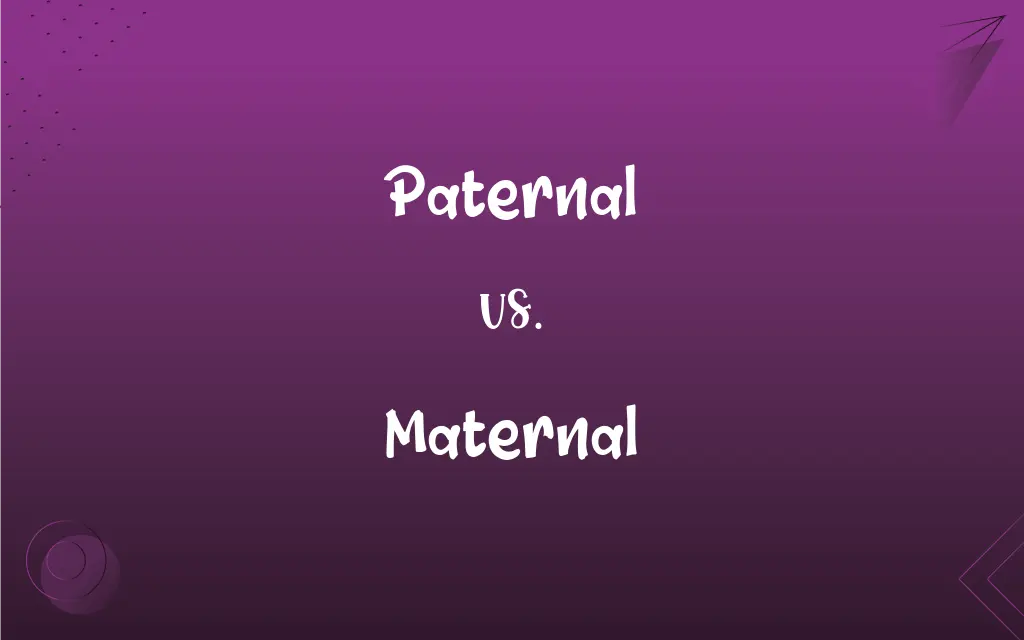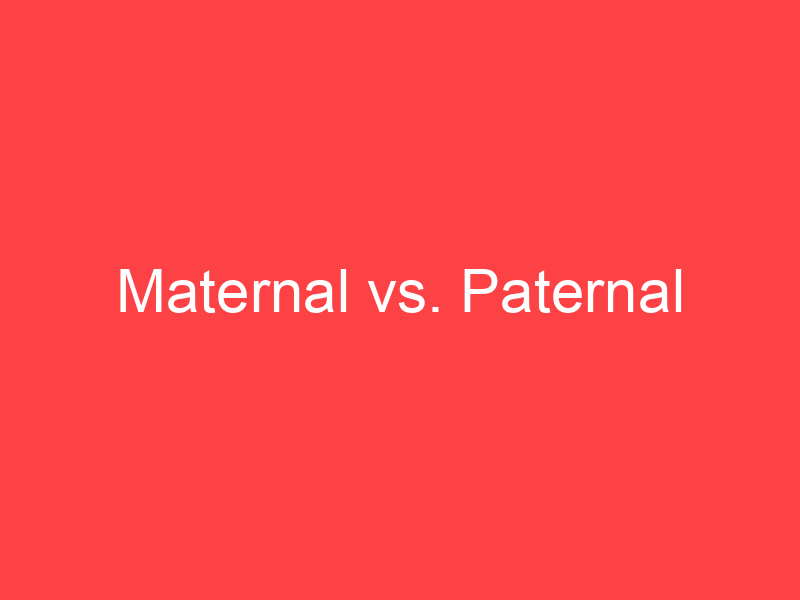What’s the distinction between maternal and paternal influences? This query delves into the multifaceted influence of each mother and father on a baby’s improvement, encompassing organic, societal, and cultural dimensions. From the elemental genetic contributions to the nuanced societal expectations, understanding this intricate interaction is essential for comprehending the holistic upbringing of a kid. This exploration unravels the complexities of how moms and dads form their kids’s lives, offering a complete overview.
The organic variations stem from the distinct genetic materials every father or mother contributes, resulting in a singular mix of traits. Societal expectations typically differ, shaping the roles and tasks assigned to moms and dads. Cultural norms additional diversify these views, impacting the upbringing of kids. In the end, this examination illuminates the profound and numerous influences each mother and father exert on their kids, impacting every thing from bodily attributes to persona improvement.
Organic Variations: What Is The Distinction Between Maternal And Paternal

Understanding the nuances of maternal and paternal genetic contributions is essential for comprehending human improvement and inheritance patterns. The blueprint of life, encoded in our DNA, is a posh tapestry woven from threads of each mother and father. This part delves into the specifics of those contributions, analyzing the organic mechanisms driving the distinctive mix of traits handed down from era to era.The elemental constructing blocks of this inheritance are chromosomes, tightly coiled strands of DNA.
People inherit 23 pairs of chromosomes, one set from every father or mother. Crucially, these chromosomes aren’t merely duplicates; they carry distinctive genetic info, contributing to the range and complexity of the human species. The precise genetic make-up, influenced by these contributions, in the end shapes a baby’s bodily traits, predispositions, and potential vulnerabilities.
Genetic Contributions from Every Guardian, What’s the distinction between maternal and paternal
The inheritance of traits just isn’t a easy 50/50 cut up. Whereas each mother and father contribute equally to the variety of chromosomes, the particular genes carried on these chromosomes can differ considerably, resulting in numerous outcomes. This unequal contribution highlights the intricate dance of genetic info. The distinctive genetic combos are the cornerstone of the outstanding variety inside the human inhabitants.
Particular Chromosomes and Genes
The twenty third pair of chromosomes, often called the intercourse chromosomes, carries genes that decide a baby’s intercourse (XX for feminine, XY for male). Different chromosomes, autosomes, carry genes for a big selection of traits. The mom contributes an X chromosome in all instances, whereas the daddy contributes both an X or a Y chromosome. This distinction within the intercourse chromosome inheritance sample underscores the distinct contributions of every father or mother.
The precise genes positioned on every chromosome decide a variety of traits, impacting bodily attributes, predispositions to sure illnesses, and even cognitive skills.
Varieties of Traits Inherited
- Bodily Traits: These embody eye coloration, hair coloration, top, and construct. For instance, the gene for brown eyes is commonly dominant over the gene for blue eyes, illustrating the potential for diverse expressions of bodily traits.
- Predispositions to Illnesses: Sure genetic predispositions to illnesses like cystic fibrosis, Huntington’s illness, and sure cancers could be inherited from both father or mother. This emphasizes the numerous position of genetics in well being outcomes.
- Cognitive Traits: Whereas advanced, facets of cognitive skills, akin to studying kinds or sure psychological predispositions, are doubtlessly influenced by the mixed genetic materials of each mother and father. This demonstrates the intricacy of inheritance and the multitude of contributing elements.
Organic Mechanisms of Inheritance
Throughout fertilization, the egg and sperm mix, leading to a single-celled zygote containing the complete complement of 46 chromosomes. The distinctive mixture of genes from every father or mother shapes the event of the kid, highlighting the intricate organic processes driving inheritance. The precise mechanisms behind this embody the alignment of homologous chromosomes throughout meiosis, the method by which gametes (sperm and egg) are produced.
This course of ensures the exact segregation of genetic materials, resulting in the distinctive mixture of genes handed right down to the offspring.
Inheritance Patterns Desk
| Trait | Mom’s Contribution | Father’s Contribution | Instance |
|---|---|---|---|
| Eye Colour | Genes for eye coloration | Genes for eye coloration | Brown eyes from each mother and father, resulting in brown eyes within the baby. |
| Top | Genes for top | Genes for top | Tall mother and father, baby with intermediate top. |
| Blood Sort | Genes for blood kind | Genes for blood kind | Mother and father with kind A and kind B blood, baby with kind AB. |
| Illness Predisposition | Genes for predisposition | Genes for predisposition | Guardian with a predisposition to coronary heart illness, baby doubtlessly inheriting the predisposition. |
Societal and Cultural Variations
Societal expectations surrounding parenthood are deeply rooted in cultural norms, impacting how moms and dads are perceived and handled. These expectations, typically implicit and evolving, form the roles, tasks, and even the alternatives out there to oldsters. Understanding these nuanced variations is essential for fostering a extra equitable and supportive surroundings for households throughout numerous cultures.The historic and up to date societal expectations surrounding maternal and paternal roles differ considerably throughout cultures.
These disparities typically mirror deeply ingrained cultural beliefs about gender roles, household buildings, and financial elements. Whereas many cultures are shifting towards better equality, important disparities persist, impacting the well-being of households and people.
Historic Expectations of Parental Roles
Historic societal expectations regarding parental roles have ceaselessly been gender-specific. In lots of conventional societies, moms had been primarily answerable for childcare and family duties, whereas fathers assumed the position of supplier and decision-maker. These expectations had been typically bolstered by spiritual, social, and financial elements.
Modern Societal Expectations
Trendy societies are witnessing a shift in parental expectations, albeit erratically throughout totally different cultures. Whereas the normal division of labor persists in lots of locations, there is a rising recognition of the significance of shared tasks between moms and dads. This evolution is pushed by elements akin to elevated feminine participation within the workforce, altering financial situations, and evolving social attitudes.
Cultural Variations in Parental Obligations
Cultural norms considerably affect the tasks and expectations positioned on moms and dads. In some cultures, childcare stays largely the mom’s area, with fathers enjoying a supporting position. Conversely, in different cultures, each mother and father share tasks extra equally.
Evaluating Cultural Views on Parental Contributions
Completely different cultures have various views on the contributions of every father or mother to a baby’s upbringing. Some cultures emphasize the mom’s nurturing position, whereas others spotlight the daddy’s position in offering steerage and safety. The perceived significance of every father or mother’s contribution typically intertwines with cultural values and beliefs.
Contrasting Cultural Variations in Parental Rights and Obligations
| Cultural Characteristic | Cultural Instance 1 (e.g., Scandinavian nations) | Cultural Instance 2 (e.g., some components of Latin America) |
|---|---|---|
| Parental Go away | In depth parental depart for each mother and father, encouraging shared childcare tasks. | Parental depart predominantly targeted on moms, with restricted or no depart for fathers. |
| Family Obligations | Shared family tasks, with each mother and father actively collaborating in duties. | Conventional division of labor, with moms typically bearing the first duty for family chores. |
| Determination-Making Authority | Shared decision-making authority, empowering each mother and father in issues associated to the kid’s upbringing. | Determination-making authority typically focused on the daddy or male head of the family. |
| Social Expectations | Equal societal expectations of moms and dads, with each actively concerned in household life. | Differentiated social expectations, doubtlessly emphasizing the mom’s position in childcare and the daddy’s position in offering for the household. |
The desk above supplies a simplified comparability. The realities are advanced and differ inside every cultural group. The specifics rely upon quite a few elements, together with socioeconomic standing, training ranges, and particular person household values.
Ending Remarks

In conclusion, the interaction of maternal and paternal influences is a posh tapestry woven from organic inheritance, societal expectations, and cultural norms. Understanding the intricate variations and their multifaceted influence is important for fostering wholesome and well-rounded baby improvement. The exploration highlights the profound roles each mother and father play, in the end shaping the people they assist deliver into the world.
The distinctive mixture of genetic, societal, and cultural influences creates a baby’s distinct id and trajectory.
FAQ Useful resource
What are some examples of traits inherited from every father or mother?
Traits like eye coloration, hair texture, and sure predispositions to illnesses are sometimes linked to particular genes inherited from both father or mother. Whereas some traits are extra strongly related to one father or mother than the opposite, the intricate interaction of each parental genes in the end shapes the kid’s traits.
How do cultural norms affect the perceived roles of moms and dads?
Cultural norms typically dictate the particular roles and tasks related to every father or mother. Some cultures emphasize the mom’s position in nurturing, whereas others may spotlight the daddy’s position in offering for the household. These differing cultural views can profoundly influence the upbringing of kids.
Can parenting kinds from every father or mother affect a baby’s social-emotional improvement?
Sure, the distinctive parenting kinds employed by every father or mother can considerably influence a baby’s social-emotional improvement. For instance, a father or mother’s strategy to self-discipline, emotional help, and communication can form a baby’s capacity to navigate social conditions and handle their feelings.
What are some potential long-term impacts of the totally different parenting kinds?
The long-term impacts can differ considerably relying on the particular parenting kinds and the kid’s particular person temperament. Whereas some kids may thrive in sure environments, others may expertise challenges in adapting to numerous conditions. The mix of each mother and father’ approaches in the end creates a singular developmental surroundings.
